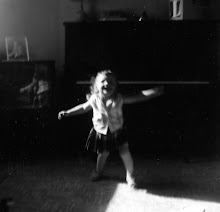In some part of my brain, incrementalism makes me see each new problem in isolation, or at least not such a big deal all by itself. My perspective is probably a result of the anti-depressant to a great degree.
But as things mount up, I'm beginning to accept that I'm on a pretty slippery slope; that the disease is devouring my body in fits and starts and though I still haven't been given a time limit, I am not the person I was four months ago. How does it feel to be me? I can't walk; I'm constantly dizzy; I feel as though I have a metal girdle around my middle; I'm deaf in one ear; I can't speak above a whisper; and I can't swallow food without choking. When I put it like that, it does sound dire, unfair, sad, pitiful, all the things that I know other people think and sometimes say when they hear what I'm dealing with. I recognize their pity (though most people are pretty upbeat around me), and it's always a little shocking to me. For me to admit it's that bad means to admit that I'm dying. That's a very hard thing to do.
I find it interesting that while I was even sicker than this, in the hospital, all I wanted to do was die. All my life, I had watched portrayals of people who were suffering so much they craved death, and the poverty of my imagination made it impossible for me to comprehend that impulse. Suddenly, in the hospital, I understood it deeply. Death seemed a welcome respite, and life had little appeal.
Conversely, as I began to feel better, my energy level rose and my legs gained a little more flexibility (and my anti-depressant was increased), I started to want to live again. But oddly, when I do get sad now, I get really sad. When you feel well, you want to live and you feel happiness, and having a terminal illness is a real downer, so in turn you can get quite blue at the thought of soon losing all you hold so dear. On the other hand, since feeling really sick saps your will to live, and there isn't much left to hold dear, it must make dying much easier than I would have expected. But who knows: maybe when I get really close to it, my attitude will change.
And maybe the fact that I feel somewhat better than I did last month means I'm not at death's door. But my quality of life has deteriorated more than I've been willing to admit.
Those who've taken anti-depressants may recognize how much easier they make it to ignore one's troubles. A friend who has taken them agreed, and said, "Yes, you're just building up to a big, devastating emotional crash, and all of a sudden you say, 'Gee, wasn't I going to make pancakes?' and in an instant you've been completely distracted from your difficulties." You just can't sustain your depression. It's like all your problems are behind a door -- you know they're behind that door, and you know exactly what they are, but the door is allowing you to ignore them.
There was an interesting article by Louis Menand in The New Yorker this week that included a lot of evidence that anti-depressants operate mostly by placebo effect, which I find hard to believe, but the opinion that up to a certain point we should allow ourselves to experience the real highs and lows of our lives rather than medicalize them makes a certain amount of sense to me. In theory. In practice, I can't do it.
Meanwhile, today I saw the ear, nose and throat specialist and had a hearing test. I learned that:
- There is an injection they can do to try to cure the vocal cord problem with an 80% success rate (though it may be temporary). It's done under general anesthetic and involves some kind of compound related to hyaluronic acid. And it's not covered by Ontario health insurance.
- The hearing loss is not related to the vocal cord paralysis.
- The hearing loss in my right ear is pretty much total.
In the meantime, I have a ferocious appetite. It's really hard to choke the food down, but all I can think of is food, after a period of having little appetite. It's either the return of my usual emotional-eating pattern (especially since I'm not exactly occupied with pressing things all day), or the drugs I'm taking.








No comments:
Post a Comment